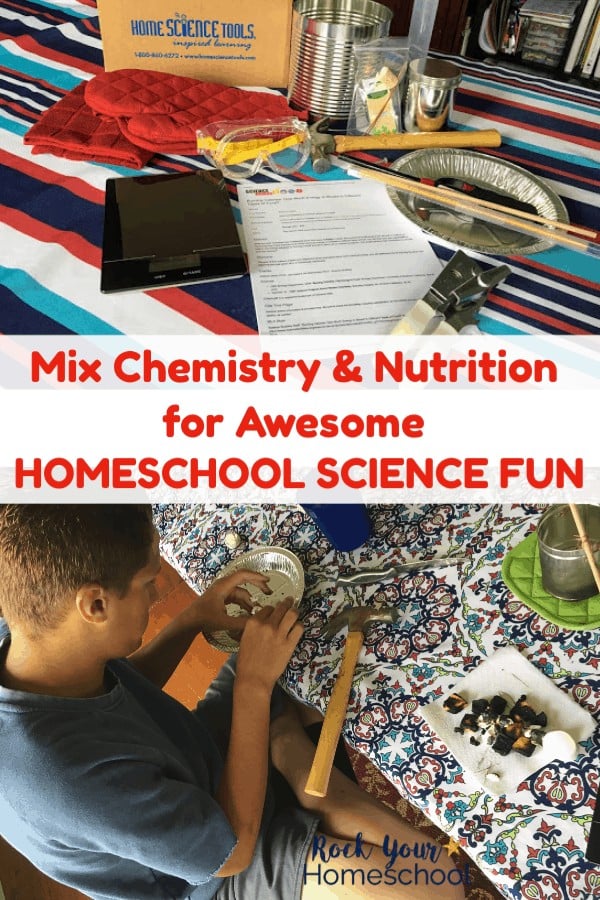
You CAN make homeschool science fun and interesting, even in high school! Find what I’m doing with my boys to give them hands-on activities to boost homeschool high school science.
Science is one of those subjects that a lot of homeschool moms worry about teaching. Many moms worry about the cost, effort, and know-how to present effective yet engaging homeschool science lessons at home. I’ve had these fears myself and almost let them get in the way of our homeschool joy.
Disclaimer: I received these Homes Science Tools products for free and was compensated for my time. All opinions are 100% honest & I wasn’t required to post a positive review.
But, I’m a firm believer that homeschool can be an enjoyable process for all without breaking the bank or losing your sanity. That’s why I was so excited to get my hands on these fabulous resources from Home Science Tools and share how they can help you rock your homeschool science!
Common Homeschool Science Fun Myths
Let’s do some homeschool science fun myth bustin’!
If I had a nickel for every time I’ve been asked how in the world I could expect to teach homeschool science (especially high school) and still make it fun, I’d have a tidy little nest egg.
Have you heard or experienced any of these myths related to homeschool science?:
- “Oh, you can’t possibly teach homeschool science! It’s such a complicated subject.”
- “You don’t have a science degree! How can you teach it?”
- “Science resources cost a ton of money. There’s no way you can afford to teach science at home.”
- “Do you want your house to explode?!? You don’t have a science lab in it.”
- “Teaching homeschool science would take so much time! Plus, all the experiments!”
- “Where can you even find quality homeschool science materials?”
- “Homeschool science materials must be so expensive. You’ll have to donate blood.” (Yes, I’ve really been told this one!)
Before I found Home Science Tools, I actually believed a few of these homeschool science myths myself. I actually doubted my ability and our limited budget.
Fortunately, I’ve discovered that ALL of the above are just WRONG! Here’s why:
- You don’t need a science degree to teach homeschool science. At Home Science Tools, you’ll find the materials, instructions, and explanations you need to help your kids enjoy homeschool science fun.
- You can select homeschool science projects to fit your budget. Browse Home Science Tools and you can find a variety of topics and kits at different price points.
- Again, pick projects that fit your schedule (even if it’s erratic like ours). Read the description of each project/experiment to determine when it will best fit your schedule.)
- Home Science Tools is your go-to stop for all things homeschool science. Get the materials and support you need to make homeschool science rock!
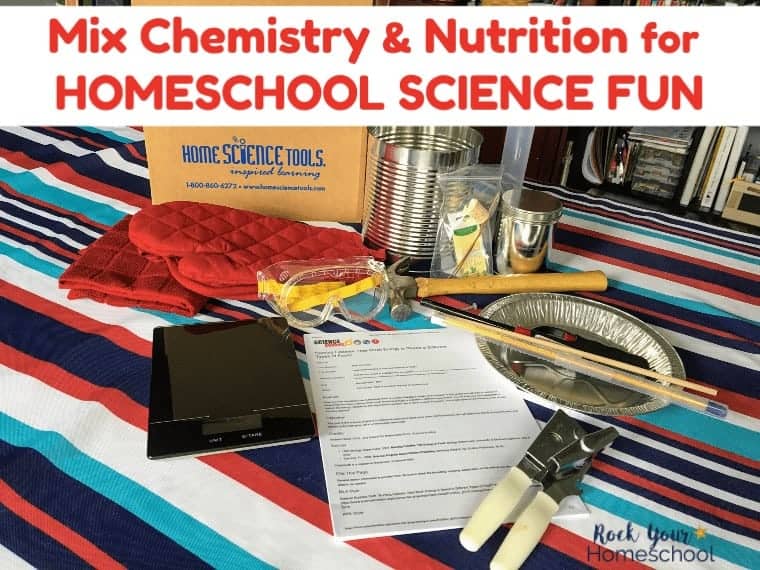
What I’m Doing to Conquer My Fears of Teaching Homeschool Science
If you’re still wondering if you can actually homeschool science (especially at the high school level), I hope my story helps.
I’m all about homeschooling. It’s truly the best choice for our family. I have, however, had doubts about homeschooling high school science.
Chemistry is not my forte. In fact, it’s my kryptonite. Inorganic chem is what finally had me switch from a pre-med major to psychology. (Psych was such a better fit but still…)
When my oldest told me that he wanted to continue homeschooling through high school, I went into a bit of a panic. How the heck could I teach homeschool high school science? Biology-sure! Chemistry-eek!
I decided that I’d outsource homeschool high school science. We’d find an online option or even something local. But, my oldest begged me to teach him. So, I decided that it was time to overcome my fears of homeschooling high school science.
I knew that a hands-on and interactive approach was important because that’s how our homeschool functions best. Also, budget-friendly was key!
Home Science Tools has helped me provide a fun and engaging homeschool science experience for my boys that fits all of these requirements.
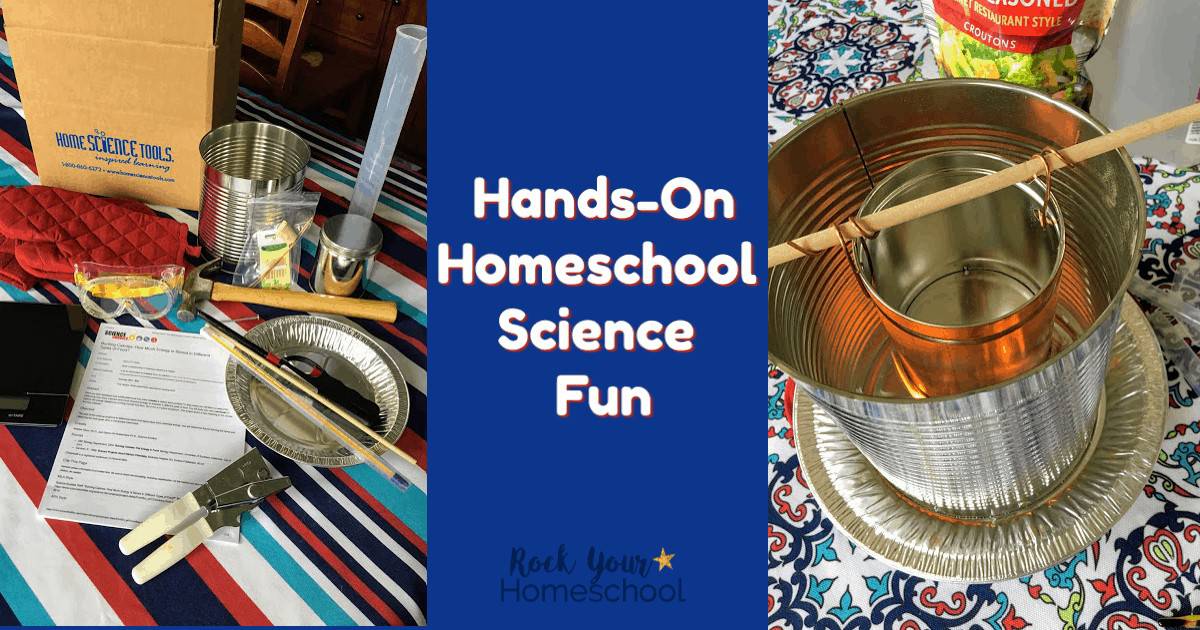
Cool Chemistry + Nutrition Experiment for Homeschool Science Fun
To make homeschool science fun for my boys, I’ve been connecting it to their interests. My two older boys play competitive soccer. Whenever I can relate a subject to soccer, health, or nutrition (like this comparing nutrition labels activity), I know I’ve got their attention.
And when my older boys are interested, my three younger boys want to get involved.
When I was browsing Home Science Tools to figure out what experiments we’d be doing this homeschool year, my eyes popped at this Calorimeter Kit. I knew my boys would love it! I mean, what’s the best way to get kids involved in anything? FOOD!
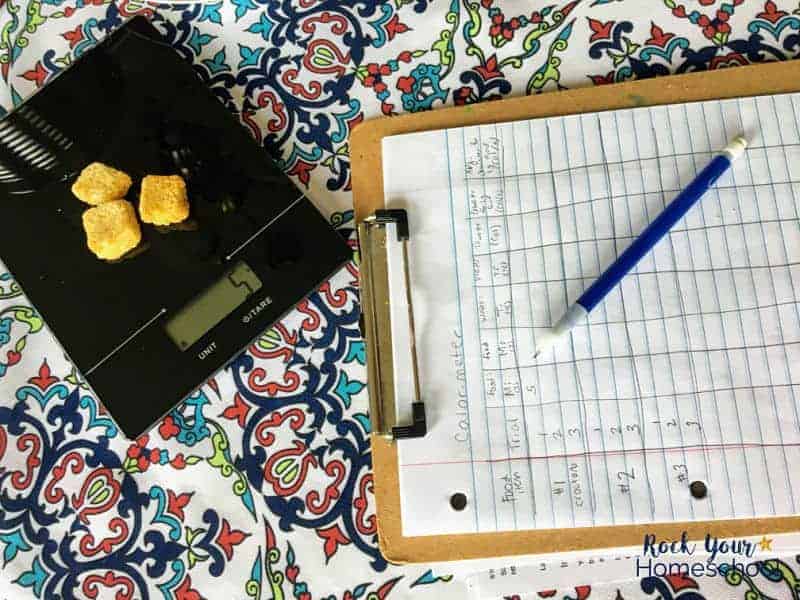
After reading the downloadable science kit instructions for the experiment, I smiled and clicked add to cart. The combination of nutrition and chemistry was a no-brainer.
My two older boys’ soccer coaches emphasize health and nutrition as part of their training. This Calorimeter Kit looked like a great way to make nutrition come to life through chemistry.
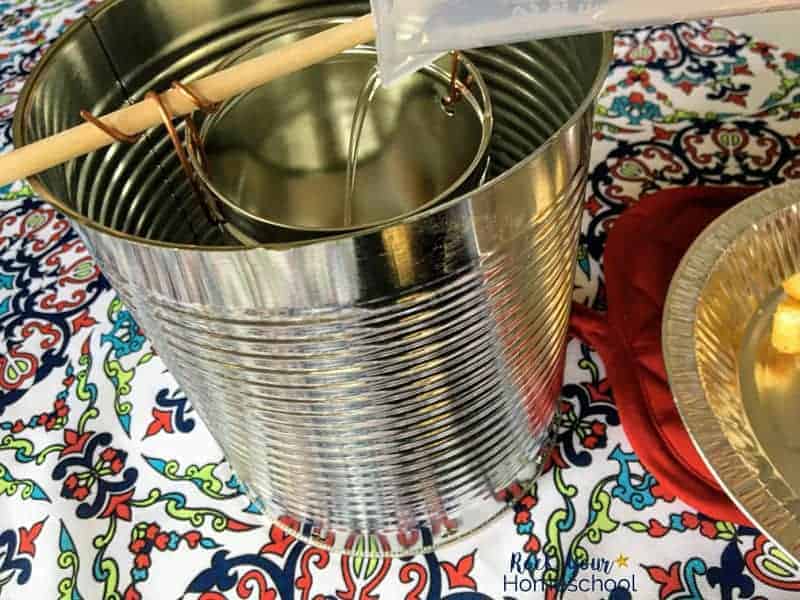
Oh my stars! This experiment exceeded our expectations! My boys now want to test every possible food item by using the materials in this kit. And I love that they’re also practicing math equations without a fuss.
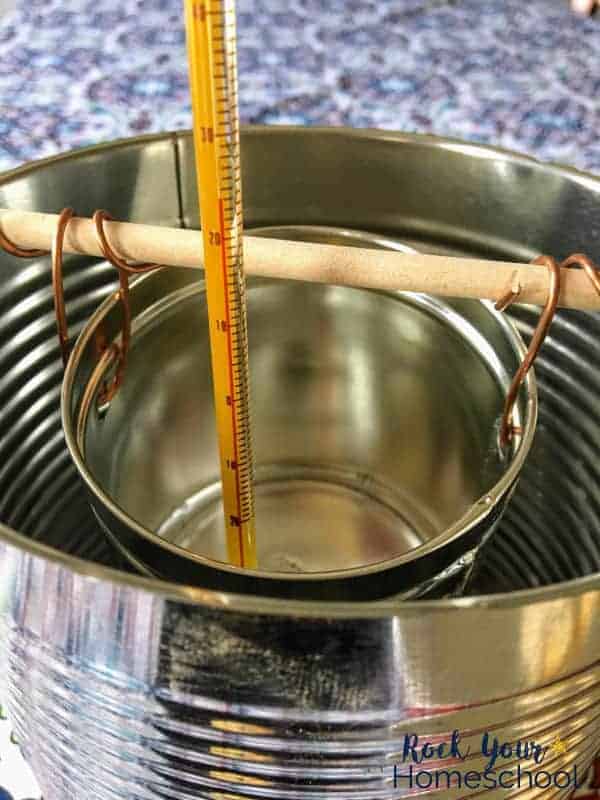
The best part about this chemistry + nutrition experiment: everything was easily detailed and explained. I printed off 15 pages to guide us through this experiment. Each and every step was helpful. I was so grateful to have thorough explanations for concepts like calorie, oxidation, and efficiency, as well as the necessary equations to complete the experiment.
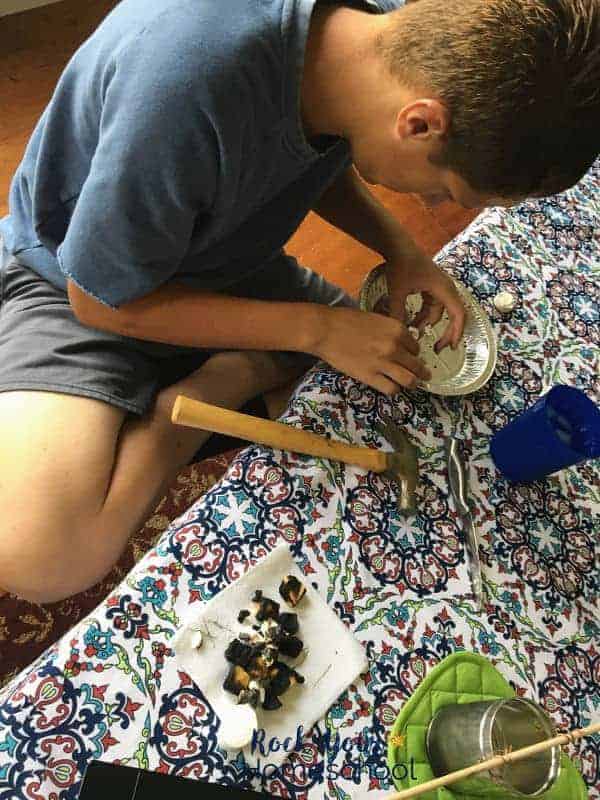
Plus, there’s a super cool section near the end of the printable pack that provides related careers if you like this experiment. (And much to my surprise, Professor (13) is chatting about a career in sports nutrition. This boy does not care for math yet is ready to dig deep to learn more about this career path!)
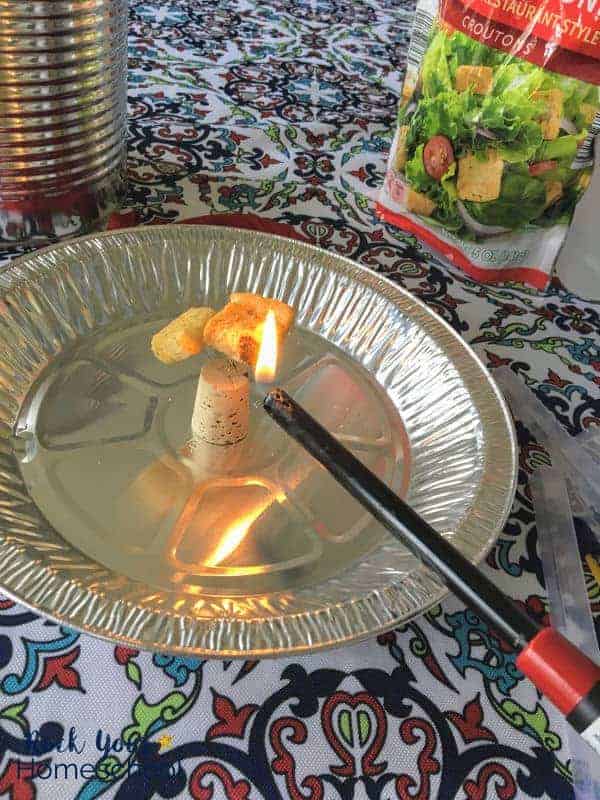
Here’s a quick video of the croutons burning during our second trial.
Also, science fair suggestions and related links for doing more research are provided in the downloadable pack! Super cool if you participate in a homeschool co-op science fair or other similar event.
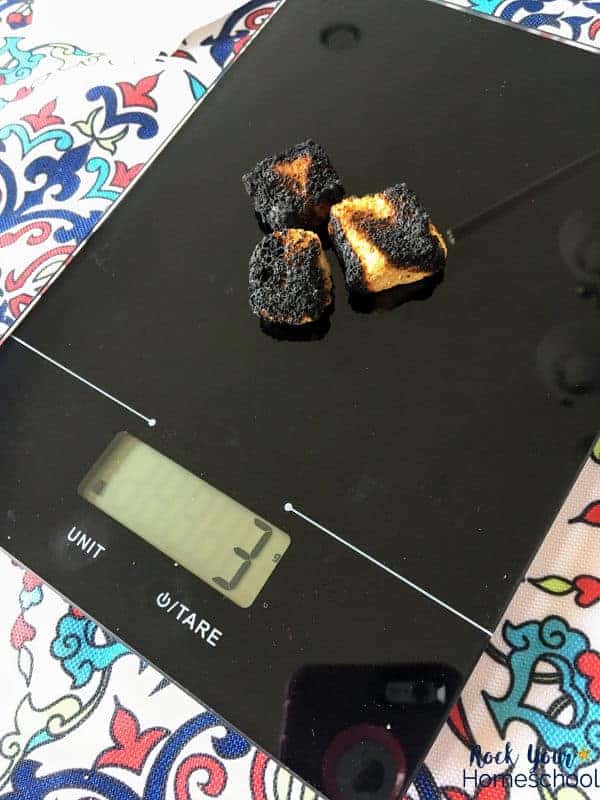
The Calorimeter Kit is an excellent and affordable experiment for homeschool high school science. I do have a few tips and suggestions for you if you decide to go for it:
- Instead of a long match, use a butane lighter (we call them “long” lighters). Depending on the food item you choose, you may find a butane lighter to work better.
- Perform the experiment in the kitchen with the windows open (and beware of fire alarms) or outside on a day with little wind. The food items will burn and smoke.
- Have all materials ready to go and close at hand.
- Make LARGE holes in the large can to help get enough air to the flame Oh, and use a drill. I’m like Olive Oyl with barely any arm muscles. Even my almost 6’1″ strong oldest boy couldn’t complete the step to hammer a nail through the large can. Daddy used a drill to easily make large holes. So much easier!
- Select three or more different types of food: one with higher fat, lower fat, density, etc. If you can pick foods that are common in your home, even better!
- Set aside at least one hour. We chose to do this experiment on the weekend when we had extra time because our afternoons are tight with soccer practices and such.
- Have a calculator on hand. Your kids will need to do some equations. They might find it less stressful if they can use a calculator.
More Ways to Rock Chemistry & Nutrition for Homeschool Science Fun
This Calorimeter Kit is just the tip of the iceberg when it comes to chemistry and nutrition homeschool science fun. Home Science Tools also has these amazing resources to help you rock your homeschool science:
- Complete Introduction to Chemistry Kit: Yowzers! This kit is ah-mazing! I’ll be using this kit with my boys. Over 27 experiments + safety equipment = tons of homeschool science fun!
- Chemistry of Food Experiment Kit: This kit is a natural extension from the Calorimeter Kit. We can’t wait to get started with this one.
- Vitamin C Experiment Kit: Another natural extension. Professor (13) is big on learning about supplements, especially Vitamin C, so this kit is a definite.
- Science in the Kitchen Kit: We’ll be using this kit to tie together their cooking and baking lessons with science. I love when we can combine subjects, save time, and save money!
Keep the homeschool science fun going! See what other materials and kits are available from Home Science Tools that you can use to boost your homeschool science. Homeschool Science Tools has a fantastic program called My Science Perks! When you sign up by clicking HERE, you’ll get a $5 off coupon plus find out ways to easily earn more points (like following on Facebook and Instagram).
What other homeschool science fun kits and materials can you find on Home ScienceTools?
Please share in the comments below because I’m continually adding to our list plus know other homeschool families can benefit.







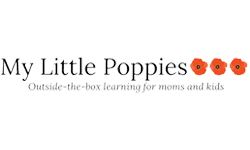





What a great idea! I had to custom make a lot of our homeschooling with my son to get him even remotely interested. His only interest is hockey. So, we did a lot of hockey related science and reading. For geography, we learned where all the NHL teams were located and things about the area. It was really fun.